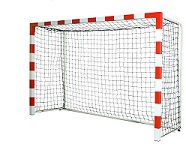European Handball Regulations


Eligibility
The Intramural sport convener may modify these rules at their discretion. The Intramural sport convener and officials have the discretion to rule on any matter not covered by these rules.
Number of Players
• In cases where teams only have 1 of a particular gender, they must play shorthanded (i.e., 5 [4M:1F] vs. 6), you may not replace the missing person with someone of the opposite gender. If this is not possible, the offending team will default.
• The maximum roster size per team = 13 (with a minimum of 2 of each gender).
• In order to play, a team must have a minimum of 4 players, (including a minimum of one of each gender) ready to play 10 minutes after the scheduled start time, if not, the match will be defaulted to the opposition. The goalie is not included in the gender counts.
The Game
A. HOUSE RULES
In general, our rules are governed by IHF. Please see our house rules below for exceptions.
I. The game begins when the referee throws the ball up in the middle of the court, and the team to grab the ball gains immediate possession.
II. Teams will start each game with exactly 6 players on the floor (5 plus a goalie), including at least 2 males and 2 females. If a team has only one male or female, they must play the entirety of the game a person down. The goalie is not included in the gender counts.
III. All active players will start each game on their side of the court, and can move once the ball is thrown up in the air by the referee.
IV. All non-active players must remain seated.
V. Players are allowed to touch the ball with any part of their bodies above the knee (knee included), except for goalies who are allowed to touch the ball with all parts of their body including their feet.
VI. The goalkeeper may participate in the normal play of their teammates. As he/she is then considered as normal field player, he/she is typically substituted for a regular field player if his/her team uses this scheme to outnumber the defending players. As this player becomes the designated goalkeeper on the court, they must wear some vest or bib to identify themselves as such.
VII. If the goalkeeper deflects the ball over the outer goal line, his/her team stays in possession of the ball. The goalkeeper resumes the play with a throw from within the crease ("goalkeeper throw"). Passing to your own goalkeeper results in a turnover if they are in the goal crease. Throwing the ball against the head of the goalkeeper when he is not moving is to be punished by disqualification ("red card").
VIII. Goalkeeper-throw: If ball crosses the outer goal line without interference from the defending team or when deflected by their goalkeeper, a goalkeeper-throw is awarded to the defending team. This is the most common turnover. The goalkeeper resumes the play with a throw from anywhere within his goal crease.
IX. A player who is in possession of the ball may stand stationary for only three seconds and may only take three steps. They must then either shoot or pass the ball. At any time taking more than three steps is considered travelling and results in a turnover (given to the closest player of the opposing team, in which the team that just lost the ball must stand at least two meters from the player of possession).
X. Dribbling the ball is not permitted. Any player who dribbles the ball will be called and a throw will be awarded to the opposing team.
XI. No physical contact is allowed between players.
XII. Any intentional harm or throws to the head will result in a penalty. It will be at the referees discretion as to whether the game will continue and a turnover will occur, or if the player will receive a penalty and be ejected indefinitely.
XIII. If two opposing players both have possession of the ball for more than 3 seconds, the play will be stopped and the ball will be thrown up between those two players, by the referee (same as in the beginning of the game).
XIV. The games will consist of two, 20 minute halves, and a 5 minute halftime. The games must be finished in the hour time slot, and can be ended earlier by the referee if necessary. Games will be started as soon as both teams arrive.
Substitutions
I. After a goal is scored by either team, substitutions may be made. The referee must be notified and agree before this takes place.
B. EQUIPMENT & UNIFORMS
• The required uniform includes: closed toed athletic shoes, shirt, and shorts.
• Safety gear is optional (mouth guard, jock strap, helmet, knee pads, etc.)
• A different colour shirt than the team, for the goaltender
C. OVERTIME PROCEDURES
• There is no overtime during the regular season. Games ending in a tie will be recorded as such.
• During playoffs, any games ending in a tie will go straight into overtime.
• Overtime will be a five minute running time period.
• The score after the five minutes has expired will be the final result.
• If the game remains in a tie after one overtime period, another five minute period will begin.
• Overtime periods will continue until a winner is decided.
D. PLAYOFFS
• Format will be determined by the Intramural sport convener and communicated to participants before the start of playoffs.
Sportsmanship
Playing Field Conditions
• In the event of a problem with lights or leakages, captains will be notified and games will be rescheduled, if possible.
• When in doubt, players should expect the game to be played and arrive at the indoor facility on time. If games get/are to be cancelled the sport convener will send out a message to those affected as soon as the decision to cancel has been made.
Game Reschedules
II. Team Requests for a Reschedule - Unfortunately, once our schedules are released online we only make changes due to facility closure, etc.
III. If you need to reschedule a game, email your opponent to gain their permission to a possible rescheduling. Only if the opponent agrees to a change of game time can you email your Intramural sport convener at least 48 hours prior to the game with your request (and proof of opponent’s agreement). Requests will be accommodated when possible, but are not guaranteed. If you wish to swap game times with another game in your division, you must contact the captains of all teams involved in the game swap. The swap can only occur if all parties agree. This must be completed at least 48 hours prior to the originally scheduled game. Proof of all agreements must be sent to the Sport Convener before the game time swap can be executed.
IV. Forfeit the game: If you give at least 48 hours’ notice to your sport specific convener that your team won't be playing and that the game is a ‘forfeit’. You will lose the game, but not your Performance Bond.

